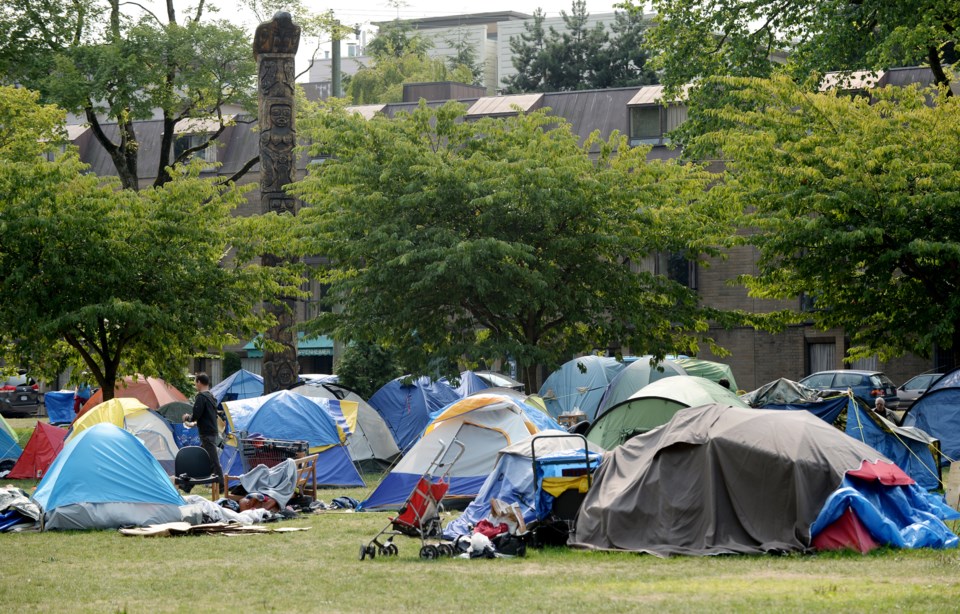More than a month after being delivered eviction notices by the city, protesters camping out at Oppenheimer Park have formed their own self-sustaining island of communal living. They are in it for the long haul.
What started out as a home to approximately 25 homeless residents has grown to living space for an estimated 150 campers. Brody Williams, a self-proclaimed founder of the ad hoc settlement and an authority figure in the camp, attributes the surge in campers to a sense of solidarity among the homeless community. “The word is out there that this is a safe place, there’s safety in numbers.”
With the surge in population, the site resembles a makeshift campus with communal facilities and unofficial roles shared among residents and non-residents to look after one another.
“What I do is just to make sure that everything’s well-maintained. That the grounds are kept clean, that people abide by my rules of zero tolerance of drugs and alcohol,” said Williams. “Basically we got signs up everywhere and everyone pretty much abides by. We have people on the outer perimeter that still do what they want.”
Despite the efforts of camp organizers to impose their own rules, city hall staff receives eight to 12 complaints daily from nearby residents and would-be park users about the tents, according to the City of Vancouver’s communications department, and staff continue to meet with organizers in the hopes they will leave voluntarily.
The protest began in July when the city delivered eviction notices to homeless residents living there. A protest developed with the campers claiming the park as unceded Coast Salish land. The city has not set a date for the tents and other structures to be removed.
Residents of the camp count on amenities like a shared camp kitchen consisting of two barbeque grills and a propane stove that feeds up to 200 meals a day, according to Williams. Other facilities include a 24-hour “sacred fire,” bathrooms for men and women, and a shared water hose for light washing and the main source of drinking water.
Camper Rose Siccama said the kitchen is supported by donations from different agencies, private citizens, and community organizations that bring leftover food for the campers. Among the items the kitchen needs the most are sugar, coffee, dish soap, jam and margarine.
Siccama added she has no plans to leave until alternative housing solutions are found.
“As long as it takes, we want these issues of homelessness addressed, we want the issues of conditions of SRO [single room occupancy] addressed, we want B.C. Housing to come to the negotiation table which they pretty much adamantly refuse to,” she said.
News of the Oppenheimer settlement drew homeless resident Donald Graffunder to the park after he was told to pack up and leave the city’s impound yard where he’d been staying. His living quarters at the camp are more spacious than others. He uses poles and an umbrella frame to hold up an abandoned tent and blanket he’s collected to create a separate living room and sleeping area.
Graffunder, who said he has been homeless for four months after being “wrongfully evicted” by a landlord who found a renter for more money, insists the camp is a temporary arrangement while his applications with B.C. Housing, non-profit Mission Possible and Carnegie Community Centre for housing-related needs are being processed. He said the agencies haven’t told him how long he’ll have to wait.
An unattributed, emailed statement from city’s communications department said the city is working with B.C. Housing to see that every homeless person at the park has “immediate housing options.”
“City staff have met with representatives of the encampment to hear their concerns and discuss the return of the park to regular public use,” the statement reads. “Both sides share the same immediate concerns about safety and adequate shelter for homeless individuals involved in the protest and the city is committed to working to resolve their housing issues. However, both sides agree that any sustainable solution requires the involvement of the provincial government. The city continues to meet with the representatives on a regular basis to work towards finding a solution.”
—with files from Naoibh O’Connor



